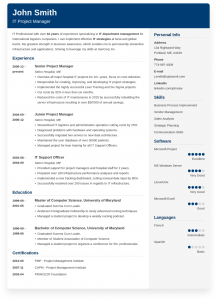Words and Phrases to Banish from Your Resume (and What to Use Instead)
Your resume has mere seconds to make a first impression. In that brief window, every word counts—which means the wrong words can instantly undermine your candidacy. While you’re carefully crafting bullet points to showcase your achievements, certain overused phrases and vague descriptors might be doing more harm than good. Pro Tip: How to use AI to make your resume stand out.
Here are the most problematic words and phrases that recruiters and hiring managers see repeatedly, along with strategic alternatives that will make your resume stand out for the right reasons.
The Buzzword Hall of Shame
“Team Player” This phrase appears on countless resumes, making it essentially meaningless. Everyone claims to work well with others, but simply stating it provides zero evidence of your collaborative abilities.
Instead, try: “Collaborated with cross-functional teams of 8+ members to deliver project three weeks ahead of schedule” or “Facilitated weekly stakeholder meetings that improved interdepartmental communication by 40%.”
“Hard Worker” or “Strong Work Ethic” These are subjective claims that anyone can make. They tell employers nothing specific about your capabilities or achievements.
Better approach: Demonstrate your work ethic through concrete examples like “Consistently exceeded quarterly sales targets by 15-25%” or “Managed simultaneous projects while maintaining 99% client satisfaction rating.”
“Results-Driven” This buzzword has become so overused that it’s lost all impact. Every professional should be results-driven, so stating it adds no value.
Show, don’t tell: Replace this with actual results you’ve achieved: “Increased customer retention by 23% through implementation of personalized follow-up protocols.”
Vague Responsibility Descriptors
“Responsible for” or “Duties included” These phrases focus on tasks rather than achievements. Employers want to know what you accomplished, not just what you were supposed to do.
Transform to impact: Change “Responsible for managing social media accounts” to “Grew social media engagement by 150% across three platforms, generating 300+ qualified leads monthly.”
“Helped” or “Assisted” These words minimize your role and make you sound passive. They don’t convey leadership or ownership.
Take ownership: Instead of “Helped increase sales,” write “Contributed to 30% sales increase by developing targeted email campaigns that converted 12% of recipients.”
“Various” or “Multiple” These non-specific terms waste valuable resume space without providing meaningful information.
Be specific: Replace “Managed various projects” with “Simultaneously managed 5 product launch campaigns with budgets ranging from $50K-$200K.”
Outdated and Unprofessional Language
“References Available Upon Request” This phrase is completely unnecessary. Employers assume you have references and will ask for them when needed. This line just takes up precious space.
Use the space for: Another achievement or skill that demonstrates your value.
“Salary Negotiable” Never include salary information on your resume unless specifically requested in the job posting. 
Focus instead on: Quantified achievements that justify the salary you’re seeking.
Personal Pronouns (I, me, my) Resumes should be written in first person without actually using first-person pronouns. This creates a cleaner, more professional appearance.
Write like this: “Managed team of 12 employees” instead of “I managed a team of 12 employees.”
Meaningless Modifiers
“Excellent,” “Great,” or “Amazing” These subjective adjectives don’t provide concrete information about your capabilities.
Prove your excellence: “Maintained 98% customer satisfaction rating” is more compelling than “Excellent customer service skills.”
“World-class,” “Best-in-class,” or “Industry-leading” Unless you have objective proof of these claims, they come across as empty boasting.
Support with evidence: “Recognized as top performer in 500-person sales organization” carries actual weight.
“Innovative” or “Creative” These overused terms have lost their impact through repetition.
Demonstrate innovation: “Developed proprietary client tracking system that reduced response times by 60%” shows innovation without claiming it.
What to Do Instead
Use Action Verbs Start bullet points with strong action verbs like “streamlined,” “spearheaded,” “optimized,” or “transformed.” These create immediate impact and show you as someone who takes initiative.
Include Quantifiable Results Numbers make your achievements concrete and memorable. Whenever possible, include percentages, dollar amounts, timeframes, or other measurable outcomes.
Tailor Language to the Industry Use terminology and keywords that are specific to your field and the job you’re targeting. This shows industry knowledge and helps your resume pass through applicant tracking systems.
Focus on Achievements Over Duties Every bullet point should answer the question “So what?” by showing the positive impact you had in your role.
The Bottom Line
Your resume should tell a compelling story of professional growth and measurable impact. By eliminating these overused phrases and replacing them with specific, quantified achievements, you’ll create a document that stands out from the pile of generic applications. If you need help with building your resume Microsoft has free templates available here.
Remember, hiring managers often spend less than 30 seconds on an initial resume review. Make every word count by choosing language that’s precise, powerful, and proves your value. Your future career depends on it.
